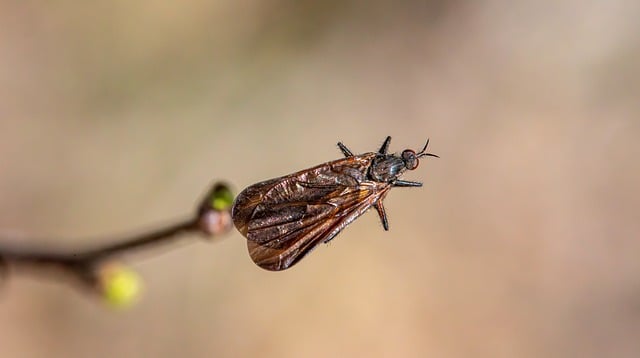Fly infestations caused by house, fruit, and phorid flies can be managed through tailored fly control services. Professionals employ strategies like eliminating breeding sites, sanitizing areas, using targeted insecticides or biological controls, and implementing regular maintenance practices. Non-chemical methods include proper sanitation, physical barriers, natural predators, and planting herbal repellents. Chemical solutions, such as insecticides and larvicides, offer powerful eradication with minimal environmental impact when applied precisely. Preventative measures like regular cleaning, waste management, and sealing entry points are crucial for long-term success in fly control services.
Tired of relentless fly invasions? This comprehensive guide offers effective solutions to eliminate fly infestations once and for all. We explore various methods, from natural remedies to advanced chemical treatments, ensuring your environment remains pest-free. Discover non-chemical approaches like sanitation and biological controls, or delve into powerful chemical options targeted at specific fly species. Learn essential preventative measures to maintain long-term fly control services.
Understanding Fly Infestations: Common Types and Causes
Fly infestations can be a significant nuisance, with various species causing trouble in both residential and commercial settings. Understanding these infestations is the first step to effective control. Common types include house flies, fruit flies, and phorid flies, each with distinct behaviors and preferences. House flies are generalists, breeding in decaying organic matter, while fruit flies are drawn to overripe or fermented fruits and vegetables. Phorid flies, often mistaken for gnats, prefer moist, rotting materials like compost piles or drain pipes.
Causes of fly infestations vary but typically involve access to food sources and suitable breeding grounds. Food waste, poorly maintained garbage disposals, and overflowing trash cans are common attractants. Proper fly control services employ strategies tailored to each type, focusing on eliminating breeding sites, sanitizing affected areas, and using targeted insecticides or biological controls to disrupt the fly life cycle. Regular maintenance and sanitation practices are key to preventing future infestations.
Non-Chemical Approaches to Fly Control Services
Many homeowners and businesses prefer non-chemical approaches to fly control services as they are environmentally friendly and safer for humans and pets. One effective method is proper sanitation and waste management. Flies breed in decaying organic matter, so regularly removing garbage, cleaning up spilled food, and maintaining a clean environment can significantly reduce fly populations. Additionally, using physical barriers like fine mesh screens on windows and doors prevents flies from entering indoor spaces.
Another non-chemical strategy involves the use of natural predators and repellents. Birds, bats, and certain insects feed on flies, so installing birdhouses or bat boxes can encourage these natural fly control services. Planting herbs like lavender, citronella, and basil around your property also acts as a natural repellent due to their strong scents that flies find unpleasant. These organic methods provide a sustainable and safe solution for managing fly infestations without resorting to chemicals.
Chemical Solutions for Effective Fly Management
Chemical solutions play a significant role in effective fly management, offering powerful tools for professional pest control services. These treatments are designed to disrupt the life cycle of flies and prevent their rapid reproduction. Common chemical agents include insecticides, larvicides, and growth regulators that target specific stages of fly development. Professional applicators carefully select and apply these chemicals to affected areas, ensuring minimal environmental impact while maximizing efficacy.
Fly control services often employ targeted chemical applications, focusing on breeding sites, resting places, and areas where flies are most active. This precise approach helps eradicate fly populations more effectively than broad-spectrum treatments, which can have unintended consequences for non-target organisms. By utilizing these specialized chemicals, pest management professionals provide businesses and residences with lasting solutions to fly infestations, enhancing sanitation, hygiene, and overall environmental well-being.
Preventative Measures for Long-Term Fly Control Services
Implementing preventative measures is key to achieving long-term success in fly control services. Regular sanitation and waste management practices are fundamental; ensuring all trash is securely contained and removed promptly creates an environment less attractive to flies. Additionally, maintaining good hygiene standards, especially in areas prone to fly accumulation like kitchens and dining spaces, can significantly reduce their presence.
For extra protection, sealing entry points and gaps in walls, doors, and windows can prevent flies from finding their way indoors. Using screened vents and installing door sweeps also acts as a physical barrier. These measures, combined with proper sanitation, form a multi-layered defence that makes fly control services more effective and sustainable over time.
In conclusion, effective fly infestations management requires a multifaceted approach. By understanding the common types and causes of these pesky flies, adopting non-chemical methods like sanitation and exclusion, utilizing targeted chemical solutions, and implementing preventative measures, homeowners and businesses can successfully eliminate fly infestations and ensure long-term control. Choosing the right fly control services tailored to specific needs is key to maintaining a comfortable living or working environment, free from unwanted fly presence.
